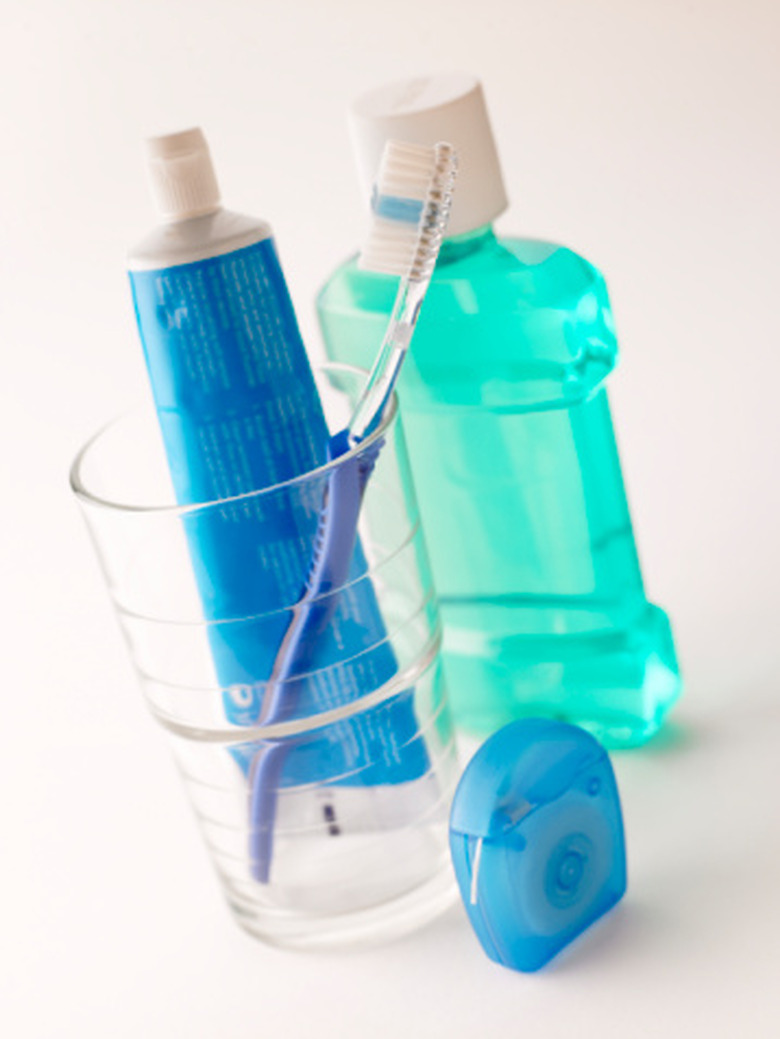Experiments On Which Mouthwash Kills Bacteria
Manufacturers often claim that their mouthwash kills bacteria. This claim can be evaluated with scientific experiments. Numerous brands of mouthwash are on the market, and numerous experiments can be conducted. The experimental variable may change from one experiment to the next, but the basics of how to carry out the experiment remain the same.
Experiment Basics
Experiment Basics
The protocol of any experiment is to limit the number of variables involved, making analysis easier after you collect the data. Depending on the design of the mouthwash experiment, the variable that will change can be the brand of mouthwash, major ingredients or the amount used. The experiment involves taking a culture of bacteria from a subject's mouth and growing it to produce many working samples. Spread these bacterial cultures onto nutrient plates. Soak a small paper disk in the experimental mouthwash and place the disk in the middle of the plate. Incubate and analyze the results.
Different Brands of Mouthwash
Different Brands of Mouthwash
One experiment can test different brands of mouthwash. Numerous brands of mouthwash can be tested at the same time. Prepare enough inoculated agar plates for each mouthwash you want to test, and a control plate as well to demonstrate the growth of bacteria without mouthwash. You can also test different formulations of the same brand of mouthwash.
Different Concentrations of Mouthwash
Different Concentrations of Mouthwash
Follow-up experiments produce more information by building on data from past experiments, making a more concise analysis possible. For example, determine whether a particular type of mouthwash slows or stops bacterial growth, then change the concentration tested. This will show whether the concentration of active ingredients is enough to kill bacteria, or if less is needed. An experimental design might test a control and full-strength, 50 percent, 25 percent, 10 percent and 1 percent solutions of mouthwash.
Alcohol Versus Non-Alcohol
Alcohol Versus Non-Alcohol
Some varieties of mouthwash contain no alcohol and are marketed to users who dislike the stinging sensation of alcohol mouthwash. Are non-alcohol mouthwashes effective in killing bacteria? To conduct this experiment, use a control, an alcohol-containing mouthwash and a non-alcohol mouthwash. Different chemicals can have the same effect through a different biological mechanism. In a non-alcohol mouthwash, a different chemical may produce the same effect.
Homemade Mouthwash
Homemade Mouthwash
To further the experiment, make a mouthwash from common household ingredients. Design the experiment the same way as the previous experiment, except make the variables the individual ingredients. A starting point may include alcohol, salt, baking soda or mild acids such as vinegar. Also, try experimenting with the concentrations of each ingredient to determine whether that has an effect.
Cite This Article
MLA
Youngker, Andrew. "Experiments On Which Mouthwash Kills Bacteria" sciencing.com, https://www.sciencing.com/experiments-mouthwash-kills-bacteria-8567439/. 24 April 2017.
APA
Youngker, Andrew. (2017, April 24). Experiments On Which Mouthwash Kills Bacteria. sciencing.com. Retrieved from https://www.sciencing.com/experiments-mouthwash-kills-bacteria-8567439/
Chicago
Youngker, Andrew. Experiments On Which Mouthwash Kills Bacteria last modified March 24, 2022. https://www.sciencing.com/experiments-mouthwash-kills-bacteria-8567439/
